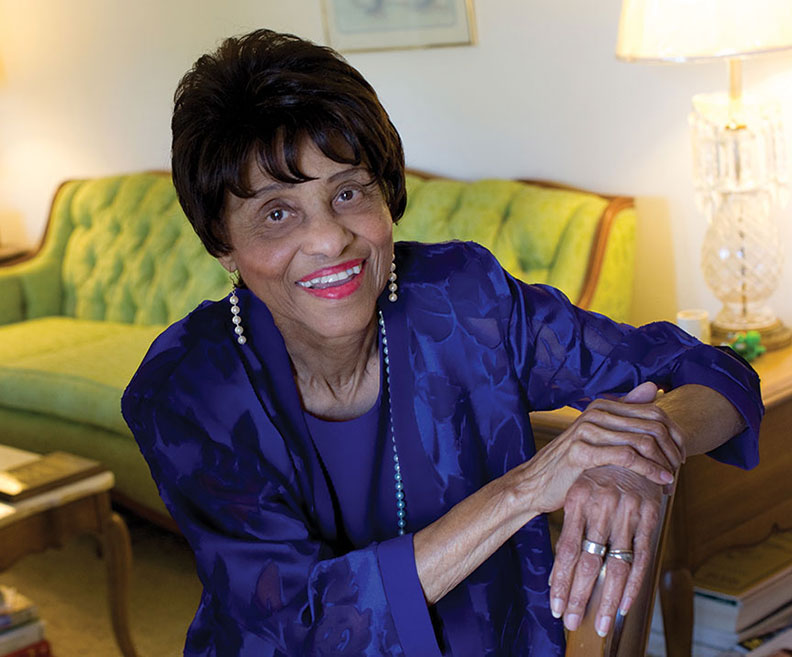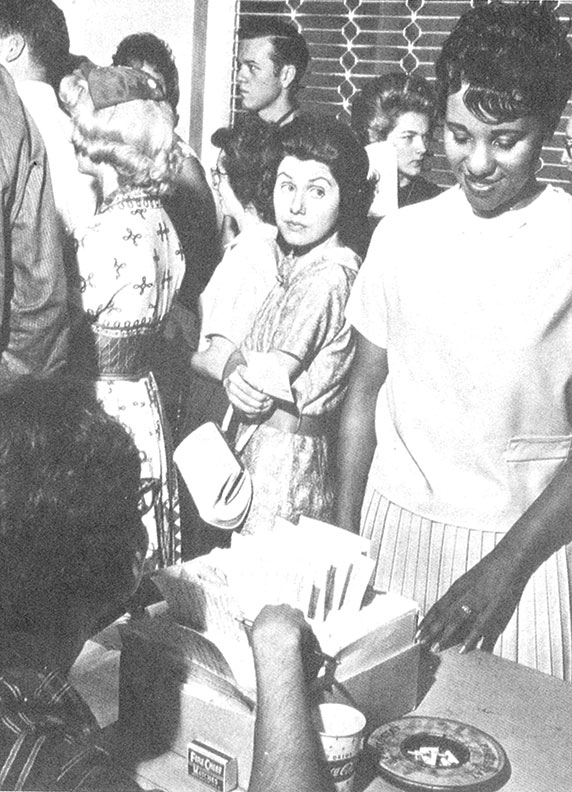Allene Jones ’63
1933-2015

Allene Parks Jones '63 was one of TCU’s first black graduates. Later, she returned as the university’s first black professor, specializing in clinical psychiatric nursing. She had a three-decade career training future Horned Frog nurses.
Allene Jones ’63
1933-2015
In September 1962, Allene Parks Jones was a registered nurse. She was working at the U.S. Public Health Service Hospital in south Fort Worth when she learned TCU planned to integrate.
Dressed in a short-sleeved yellow dress and heels the color of straw, 29-year-old Jones was older than most students. While a few stole glances at her, she barely noticed as she waited in line to register. When a photographer asked to take her picture, she smiled politely.
That day, Jones became one of the first three black undergraduate students to enroll at TCU. Six years later, she returned to TCU as the university’s first black professor, specializing in clinical psychiatric nursing, and began a three-decade career training future Horned Frog nurses.
In June, Jones died at age 81.
Becoming a pioneer was not among her thoughts in those days. Civil rights clashes rocked other parts of the country, notably in the South. At the University of Mississippi, U.S. marshals escorted James Meredith, the school’s first black student, to campus amid violent riots that killed two people. Those events, however terrifying, seemed far removed from Jones’ life in Fort Worth.
“I just wanted to go to school,” Jones told the magazine in 2011. “I was too young and naïve to understand the significance of what I was doing. It didn’t seem like a big deal.”

Allene Jones ’63 registering for classes in 1962. (TCU Yearbook)
The idea of being a nurse first appealed to Jones as a schoolgirl. At age 7, she accompanied her mother to a nearby town to visit Dr. James Dickey, the only black doctor for miles. Two black nurses worked in the office, and their sparkling clean, perfectly pressed uniform caught her eye. One of them, Marie, was especially kind and outgoing, and Jones imagined herself as a grown-up, wearing the white uniform with the red cross, helping others.
But born in 1933, in the middle of the Great Depression, when few opportunities existed for anyone, much less African-Americans, Jones and her family struggled. Her father was a cotton and corn farmer and scrapped by to pay the bills like others in their small, rural community near Giddings, Texas.
Once, Jones recalls her mother asking her father for money. Her father said he did not have any; he had loaned it to a neighbor in need.
“You gave away the last of our money?” she remembers her mother exclaiming.
“He needed it more than us,” her father replied calmly.
“That stuck with me,” Jones said. “My father always told me to treat others the way you want to be treated.”
At 16, Jones graduated from Giddings High School and moved to Fort Worth, where she lived with an aunt and enrolled in typing courses.
One year later, she met Albert Jones Jr. They dated for three years before marrying.
When Jones read about a nursing course in Dallas open to black women, Albert urged her to try it. Once a week, she rode the bus to Dallas to learn how to give injections, insert catheters and administer enemas. Students practiced only on mannequins, and Jones realized the class was not accredited. Undeterred, she continued attending and learning.
Jones enrolled in John Peter Smith’s School of Vocational Nursing, one of the few places in Fort Worth that accepted black students, and in 1954 became a licensed vocational nurse.
Two years later, she heard a rumor that St. Joseph Hospital School of Nursing planned to integrate. One day, she called the director to inquire. The director told her there were no plans now or ever to integrate.
“That would be too embarrassing,” the woman said.
However, within months, the school integrated and Jones was accepted into the registered nursing program and became the school’s first black student.
Older than many of the girls in her class, Jones became a sort of mother-figure, giving classmates advice and helping them get over squeamishness.
“Some of the girls were scared to death to give injections,” she says. “By that time, this stuff was no big deal to me. I had been doing it for years.”
One of Jones’ dreams remained unfulfilled: a college degree.
Then, while working in 1962 as a registered nurse at the United States Public Health Service Hospital in south Fort Worth, Jones learned that TCU planned to integrate. Jones applied and became one of the first three black undergraduate students at the university. Students were kind and treated her with respect, she said. A professor once asked her how she felt being one of the first black students on campus.
“There is pressure to being the first at anything,” she remembed. “If I fail, I feel like that sets the stage for future black students. I cannot fail.”
In May 1963, Jones became one of TCU’s first two black graduates. The other, Doris Ann McBride Goree, who passed away in 2009, was also a nursing student.
Psychiatric nursing appealed to Jones, and she spent three years running group therapies and learning how to interview patients at the Public Health Service Hospital, which then was a psychiatric hospital for federal prisoners with mental health or drug addiction problems.
Later, she set her sights on graduate school, an unusual goal at the time for nurses. She was accepted at the University of California Los Angeles and moved west in 1966. In 1968, Jones received her master’s degree in psychiatric nursing.
After returning home to Fort Worth, TCU offered Jones a job. In 1968, she became the university’s first black professor. The dean asked what she thought.
“Well, you have intelligent people working here,” Jones told her. “I expect to be treated like I want, and I will treat others the same way. I don’t foresee any problems.”
Jones taught clinical and psychiatric nursing, earning a reputation among students as being kind and fair.
Rhonda Keen ’78 recalled her first encounter with Jones when she was an undergraduate in an introductory, lecture-style nursing course.
Bored by the topic, Keen hid her paperback book behind school notes and secretly read a novel. After class, Jones walked by Keen. “That must be very interesting reading,” Jones told her, smiling.
“She never gave up on students,” said Keen, now the W.F. “Tex” and Pauline Curry Rankin Professor of Nursing at TCU. “She was an advocate for everyone and always believed in students.”
Among colleagues, Jones became known for her signature even temper, which she frequently used to defuse tension at staff meetings.
“Everyone would get hot under the collar over some issue or another,” Linda Curry, professor of nursing, told the magazine in 2011. “Allene was always the calm voice of reason, a soft-spoken leader. I never once heard Allene raise her voice. She never needed to. People just listened.”
Jones spent summers traveling the world, visiting Europe, Africa, China, Japan, South America and many more places.
In 1998, after three decades as a professor, Jones retired from TCU, though she remains involved with the university as an emeritus professor.
In 2011, the Harris College of Nursing and Health Sciences Alumni Association recognized Jones with the inaugural Allene Jones Trailblazer Award, which will be given to others with ties to the college who break barriers.
“Allene did blaze a path for so many others, but it was never what she set out to do,” Paulette Burns told the magazine in 2011 when she was dean of the college. “She just wanted an education. She wanted to teach. She not only improved her life, but the lives of others who followed in her steps.”

Your comments are welcome
Comments
Related Reading:
Alumni
Hal Roach Sr., TCU’s First Frog Club Director, Championed Student-Athletes for Decades
The Class of 1961 alum built unwavering support for Horned Frog athletics through years of fundraising and personal connection with fans.
Alumni
Pearce Edwards: How It Started … How It’s Going
From student journalist profiling his professors to published scholar joining their ranks, Pearce Edwards has come full circle at TCU.